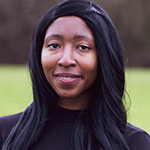 Sigourney is a third-year PhD student at the Cancer Research UK Cambridge Institute at the University of Cambridge. Her PhD focuses on developing novel models and therapeutics for a rare paediatric brain tumour, with the long-term goal of creating new therapies for children with very limited treatment options.
Sigourney is a third-year PhD student at the Cancer Research UK Cambridge Institute at the University of Cambridge. Her PhD focuses on developing novel models and therapeutics for a rare paediatric brain tumour, with the long-term goal of creating new therapies for children with very limited treatment options.
Alongside her PhD, Sigourney is a co-founder of Black in Cancer, an organisation with two key goals; first to empower and encourage future Black Cancer leaders and second to reduce cancer disparities through education and advocacy. She was also recently named as a Forbes 30 under 30 honouree for her work.
Tell us a bit about yourself and what got you interested in working in cancer?
I really became interested when my aunt died of breast cancer in 2016, eight years after her initial diagnosis. I was distraught and frustrated that there was nothing more that could be done for her.
At the time I was already working in cancer research, but it gave me an increased drive to make sure no-one else had to unnecessarily experience what we had as a family.
What made you want to start Black in Cancer, and what does Black in Cancer want to achieve?
There were a number of prompts for starting Black in Cancer, one being that I hadn’t had much visibility of Black female scientists or anyone to aspire to that looked like me.
I’d worked for three pharmaceutical companies as well as doing my undergraduate degree and never met a Black woman with a PhD. My conversations with my co-founder in the US led to the realisation that it wasn’t just me – he’d experienced the same visibility issue, over 6000 miles away.
We discussed the challenges of being a Black cancer researcher and how often we are the fount of knowledge for our own communities. We wanted to create a network and a space where there were role models, but also where Black experts from around the world could be the fount of knowledge for their area of expertise.
As a paediatric brain cancer researcher, I’m not able to delve into the treatment strategies for colorectal cancer or triple-negative breast cancer, but we wanted to create a community or network where that expertise existed.
We want to essentially eliminate the need for our organisation. We want to educate and empower the Black community in their healthcare decisions when it comes to cancer, but also to bring visibility to young Black students about a career in cancer research and support them on their journey.
Can you tell us about some of the work Black in Cancer are doing?
We are working on two main projects at the moment. The first is The Cancer Awareness Project, which aims to bring cancer education to the community.
We host monthly seminars on a range of different cancers and talk about risk factors, diagnosis, treatment and answer any questions that the community may have around this.
We have the phrase that “an informed community is an empowered one” and we want people to feel empowered about their healthcare decisions. We know that black people not only have a higher cancer burden but they face greater obstacles to cancer prevention, diagnosis, treatment, and survival.
That’s why our overall aim is to begin to reduce these cancer disparities in the black community in some small way, to allow people to survive their cancer.
The second project is The Black in Cancer Pipeline programme which aims to increase the number of Black cancer researchers and support them throughout their journey.
So far this year we’ve held a number of career pathway talks, seminars on the importance of mentorship and launched our brand-new mentorship scheme, which begins in October.
This scheme is for 30 students to be mentored and have access to a range of resources in science communication, science branding and presentation skills. This will be followed by a paid lab placement to be able to gain lab skills and make them more competitive for graduate applications.
What does the future of Black in Cancer look like?
It’s all building on the groundwork we’ve been doing over the last year. We’d love to keep going and building the mentorship programme, as well as introducing this to other countries outside the UK and the US.
Bringing the information about cancer to the community in-person – and engaging with those who aren’t engaged with the healthcare system – is key for us in terms of our aim to decrease disparities.
We’d also love to bring together an in-person conference for our members and continue to build the resources and network that we currently have.
How can Black people in the cancer workforce get involved with your work?
They can visit the website (www.blackincancer.com) or get in touch via Twitter or Instagram to be a part of the network.
What advice would you give to a young Black person thinking about pursuing a career in cancer?
Make the best of all the opportunities available to you and don’t be afraid to chase your dream. You’re more than capable and there are more of us than you know who are working to make this space more accessible for you.
